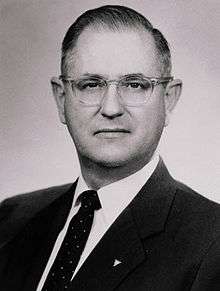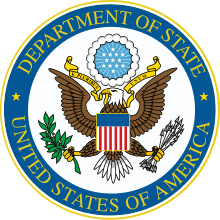William J. Porter
| William J. Porter | |
|---|---|
 | |
| United States Ambassador to Algeria | |
|
In office November 29, 1962 – July 29, 1965 | |
| President |
John F. Kennedy Lyndon B. Johnson |
| Succeeded by | John D. Jernegan |
| United States Ambassador to South Korea | |
|
In office 1967–1971 | |
| President |
Lyndon B. Johnson Richard Nixon |
| Preceded by | Winthrop G. Brown |
| Succeeded by | Philip C. Habib |
| United States Ambassador to Canada | |
|
In office March 13, 1974 – December 16, 1975 | |
| President |
Richard Nixon Gerald Ford |
| Preceded by | Adolph W. Schmidt |
| Succeeded by | Thomas O. Enders |
| United States Ambassador to Saudi Arabia | |
|
In office December 22, 1975 – May 27, 1977 | |
| President |
Gerald Ford Jimmy Carter |
| Preceded by | James E. Akins |
| Succeeded by | John C. West |
| Personal details | |
| Born |
September 1, 1914 Stalybridge, England |
| Died |
March 15, 1988 (aged 73) Fall River, Massachusetts |
| Profession | Diplomat, Career Ambassador |
William James Porter (September 1, 1914 – March 15, 1988) was an American diplomat who from 1971 to 1973 headed the U.S. delegation to the Paris Peace Talks to end the Vietnam War. Porter was the first-ever United States Ambassador to Algeria, and also served as Ambassador to South Korea, Canada, and Saudi Arabia.
Biography
William J. Porter was born in Stalybridge, England on September 1, 1914, the son of a Royal Navy officer who died during World War I. After his father's death, his mother moved to Fall River, Massachusetts to join relatives. He graduated from Boston College in 1930 and took a secretarial course at the Thibodeau College of Business Administration in Fall River 1930–32. Porter became a naturalized American citizen in 1936.
Foreign service career
After a chance meeting with United States Minister to Hungary John Flournoy Montgomery, Montgomery invited Porter to come with him to Budapest as his private secretary in 1936. The next year, 1937, Porter joined the United States Foreign Service. As a Foreign Service Officer, Porter served in Baghdad 1937–41; Beirut 1941–43; and Damascus 1943–46. While serving in Syria, he met and married Eleanore Henry, a United States Army nurse from Philadelphia, who was posted in Cairo. He spent 1946–47 at the United States Department of State in Washington, D.C. as Palestine Desk Officer. He returned to the field in Nicosia 1947–50. In 1951, he was special assistant to the Chief of Voice of America, and then spent 1951–53 as Officer-in-Charge of Greek Affairs at the State Department.
Porter spent 1953–57 at the American Embassy in Rabat; there, he was a first-hand witness to Moroccan independence in 1956. He was then the Director of the State Department's Office of North African Affairs from 1957 to 1961, and then Director of Voice of America 1961–62.
In 1962, President of the United States John F. Kennedy appointed Porter as the first-ever United States Ambassador to Algeria in the wake of Algerian independence. He showed such skill in handling both French and Algerian officials that United States Ambassador to South Vietnam Henry Cabot Lodge, Jr. asked that Porter be assigned to Saigon. He served as Deputy Ambassador to South Vietnam from 1965 to 1967. In 1967, President Lyndon Johnson appointed Porter United States Ambassador to South Korea and Porter held this post until 1971.
In 1971, President Richard Nixon selected Porter to replace David K. E. Bruce as head of the U.S. delegation at the Paris Peace Talks. Before those talks were ended, in 1973, Nixon named Porter Under Secretary of State for Political Affairs, with Porter holding this office from February 2, 1973 until February 18, 1974. Nixon then named Porter United States Ambassador to Canada, with Porter filling this post from March 13, 1974 until December 16, 1975.
President Gerald Ford then selected Porter as United States Ambassador to Saudi Arabia; Porter presented his credentials on February 21, 1976 and left this post on May 27, 1977.
Retirement
Porter retired to Westport Point, Massachusetts in 1977. He died of cancer at the Rose Hawthorne Lathrop Home in Fall River, Massachusetts on March 15, 1988.
References
- "William Porter, 73, U.S. Delegate At Vietnam Peace Talks, Is Dead", New York Times, March 17, 1988
- NNDB Profile
| Diplomatic posts | ||
|---|---|---|
| Preceded by New Office |
United States Ambassador to Algeria 1962 – 1963 |
Succeeded by John D. Jernegan |
| Preceded by Winthrop G. Brown |
United States Ambassador to South Korea 1967 – 1971 |
Succeeded by Philip Habib |
| Preceded by Adolph W. Schmidt |
United States Ambassador to Canada March 13, 1974 – December 16, 1975 |
Succeeded by Thomas O. Enders |
| Preceded by James E. Akins |
United States Ambassador to Saudi Arabia February 21, 1976 – May 27, 1977 |
Succeeded by John C. West |
| Government offices | ||
| Preceded by U. Alexis Johnson |
Under Secretary of State for Political Affairs February 2, 1973 – February 18, 1974 |
Succeeded by Joseph J. Sisco |
